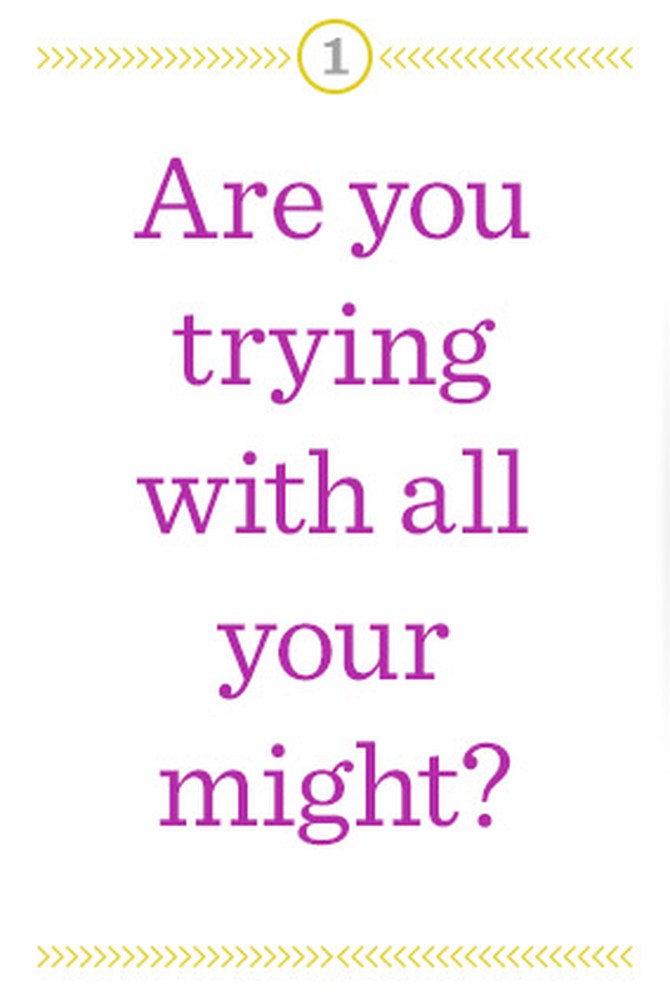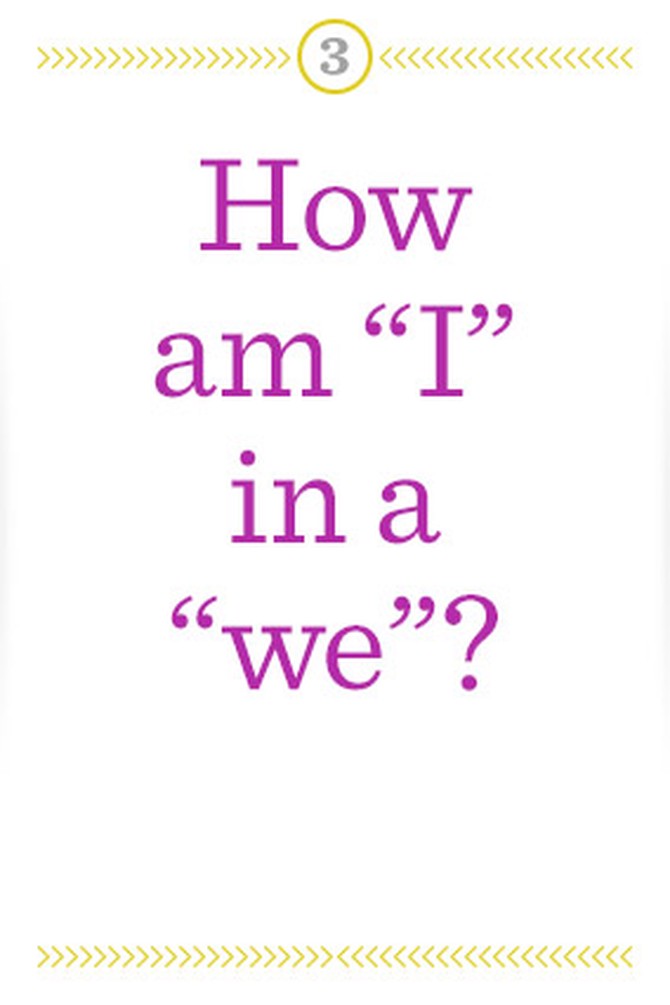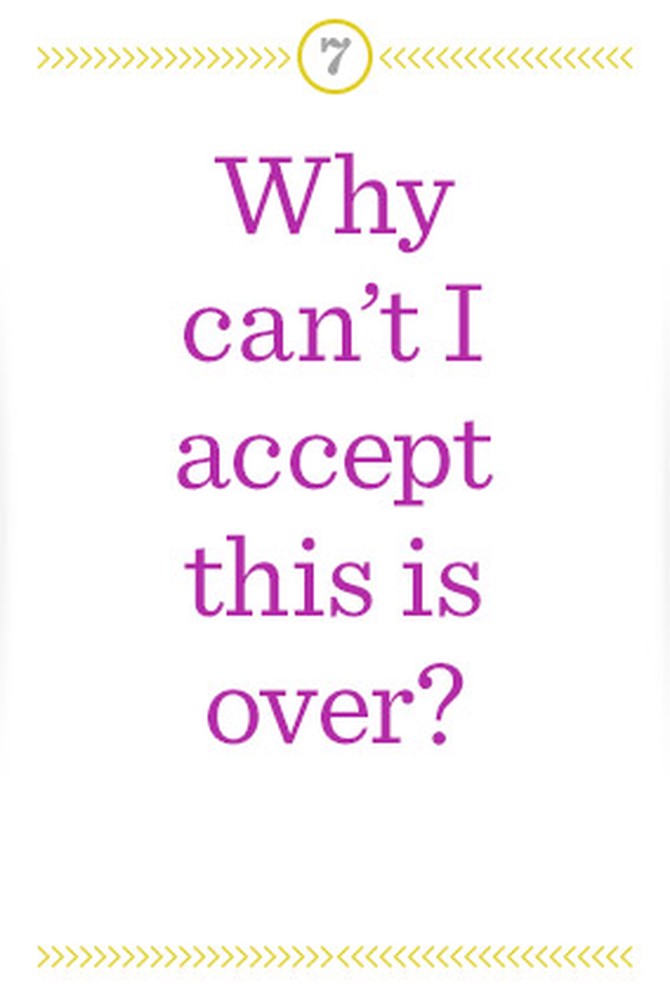8 Huge, Horrible Questions Nobody Will Ask But You
There’s really only one person who will do the dirty, thankless work of becoming the best person you can be. Here's how to get tough and honest—even when it would be so much easier not to.
By Leigh Newman

Illustration: Jen Troyer
By this I mean, are you trying with everything you’ve got—your mind, you heart, your muscles, your esophagus and all your forgotten obscure organs? If the answer is yes, then you can skip to the next question; you already realize that the most reliable path to glory is base brute effort.
If the answer is no, then you need to decide why. Is it the project that’s stopping you (you just don’t want to give that much on, say, making homemade soy candles) or is it your fear of being humiliated if you fail, having openly and fully used all of your resources? In the case of the former: You need to find something else to pursue.
Regarding the latter: Such fear is understandable. Committing to an effort that takes all of you also risks all of you. If you go splat and fail, you’ll have no feasible excuse. It wasn’t as if you waited until the last minute or blew your energy on something else. You dug down all the way to the lining of your soul. The upside, though, is that you will never, ever have to stay up at night pondering what you could have done differently or lie to yourself about what you actually did. You will end up at some kind of a peace, a place where failure might not feel like failure. It might feel like a setback for the project—or even a success for you as a human being.
If the answer is no, then you need to decide why. Is it the project that’s stopping you (you just don’t want to give that much on, say, making homemade soy candles) or is it your fear of being humiliated if you fail, having openly and fully used all of your resources? In the case of the former: You need to find something else to pursue.
Regarding the latter: Such fear is understandable. Committing to an effort that takes all of you also risks all of you. If you go splat and fail, you’ll have no feasible excuse. It wasn’t as if you waited until the last minute or blew your energy on something else. You dug down all the way to the lining of your soul. The upside, though, is that you will never, ever have to stay up at night pondering what you could have done differently or lie to yourself about what you actually did. You will end up at some kind of a peace, a place where failure might not feel like failure. It might feel like a setback for the project—or even a success for you as a human being.

Illustration: Jen Troyer
Did I remember to bring in a bag of pretzels and 25 (not 24!) juice boxes to my son’s school? Did I ask my husband about the tax-return deadline? And will I ever, ever be at some point in my life where I’ll have the two hours to myself needed to go into town and buy a needle for my busted record player? These are the worries I have on any given day. They are little worries. They are not about the fate of the planet or the course of my future. One might even say that they are trivial. And yet under them hide larger, lifelong worries (mine: being a lousy mom; suffering financial ruin because I was not in charge of every single goddamn thing in our household; becoming a boring person who no longer listens to records or music at all).
Taking a look at how much time you spend on your little worries is a good way to recognize how much time you’re spending on your big worries, even if you don’t realize that both are at play in your brain—gobbling up happiness and calm wherever they pop up. Interestingly enough, you don’t have to put much work into squashing the little ones. They go away—poof—once you’ve tackled the big ones, once and for all.
Taking a look at how much time you spend on your little worries is a good way to recognize how much time you’re spending on your big worries, even if you don’t realize that both are at play in your brain—gobbling up happiness and calm wherever they pop up. Interestingly enough, you don’t have to put much work into squashing the little ones. They go away—poof—once you’ve tackled the big ones, once and for all.

Illustration: Jen Troyer
Most of us know when we’ve been naughty, nice or nincompoops. In fact, if you’re like me, you might be too diligent in this area, scolding yourself for faults or behaviors that are probably harmless.
But what about those times when you’re in the conference room with coworkers or hanging out with friends? If everyone begins to bash your old pal Dana for being cheap, do you remind the table that she’s also the first one to offer to walk anyone’s dog during their vacations? If your supervisor heads the team off the cliff of common sense (e.g., “So from now on, we’ll focus on developing new, improved, wetter water!”) do you speak up or let the project implode? Are you okay with saying to your mommy friends on PTA, “The idea of taking the kindergarten class trip to the outlet mall is appealing, but...”
Just because you’re in a group doesn't mean you’re not you. Sitting quietly and refusing to participate in mass unkindness or ignorance is one option. Standing up and stopping it is another.
But what about those times when you’re in the conference room with coworkers or hanging out with friends? If everyone begins to bash your old pal Dana for being cheap, do you remind the table that she’s also the first one to offer to walk anyone’s dog during their vacations? If your supervisor heads the team off the cliff of common sense (e.g., “So from now on, we’ll focus on developing new, improved, wetter water!”) do you speak up or let the project implode? Are you okay with saying to your mommy friends on PTA, “The idea of taking the kindergarten class trip to the outlet mall is appealing, but...”
Just because you’re in a group doesn't mean you’re not you. Sitting quietly and refusing to participate in mass unkindness or ignorance is one option. Standing up and stopping it is another.

Illustration: Jen Troyer
Oh, God, this one is horrible. Don’t ask yourself this. Because if you do, you’re going to have to look at all those moments where you really should have behaved differently—and worse, just why on earth didn’t you? Let’s pretend the person you’re mad at is your mother. Right now, while you’re enforcing honesty at all costs, you know deep in your soul that you really weren’t angry at her for taking a 40-minute shower and using up all the hot water in the hotel last summer (because no person can use up all the water in a building with 200 rooms). Or for putting M&Ms under your toddler’s pillow “just in case he got hungry” before bed (because grandmas get to do what they want). Or for drinking a half pound of coffee in one day, ensuring that when you got up at 5 a.m. to go to work, there was nothing caffeinated to keep you from falling to the ground (because you know many alcoholics drink coffee in order to distract themselves from drinking wine—including the wine that you drank in front of her the night before). So what in the heck are you actually angry about?
That answer is an ancient tidal wave of muck that absolutely has to be addressed with a therapist or a journal or a pastor or an adviser or a friend. But quite frankly, the reason you vent your rage on the piddly stuff is because the tidal wave of muck is usually too huge and fast to get angry at, especially when you turn and face it. It will knock you to your knees. Your job is to get up.
That answer is an ancient tidal wave of muck that absolutely has to be addressed with a therapist or a journal or a pastor or an adviser or a friend. But quite frankly, the reason you vent your rage on the piddly stuff is because the tidal wave of muck is usually too huge and fast to get angry at, especially when you turn and face it. It will knock you to your knees. Your job is to get up.

Illustration: Jen Troyer
We all have things we want. We want the big, fat promotion and the new Subaru station wagon with a sunroof and one of those $2,000 Swedish storage containers strapped to the roof. We want a new upper lip and a more outgoing partner and an armchair for the living room that you don’t have throw an afghan over to hide the holes in the cushions. The problem is: Do you want the actual thing or do you want the person you think you’ll be once you get the thing... which is almost always somebody who most of us hope everybody will love? I am sorry, ladies and gentlemen, but there are a couple of times in life when hope is dead wrong. Hoping people will love you for your armchair is one of them.

Illustration: Jen Troyer
Run this inquiry though your mind every time you head home from a dinner party or a playdate or a romantic date or a day at work. When you’re doing the stuff that’s your raison d’etre, you may feel anxious about succeeding or exhausted from all the time you put in, but you don’t feel depleted. You feel the opposite: rich—in ideas, in understanding, in possibility. After brunch with friends, you leave saying to yourself, “Hey, I never thought of that before” or “Laura really called me on my b.s. about quitting my job” or “I’m going to go on a trip to the Galapagos like Ruthie.” You don’t say, “I have to go home and watch an episode of True Blood just to chill out.” Real friends give you energy, as do real hobbies and jobs and relationships. I’m not saying that everything in life has to be dipped in inspiration. Sometimes you have to do things that are boring, stupid, repetitive and annoying—but not all the time, not even most of the time. As with most things, choice does come into play.
Ideal opportunities to ask this question: before a dinner with friends who have kids the same age as your kid, a job that’s similar to yours, or any other life parallel where convenience—and not connection—could be the glue that binds you.
Ideal opportunities to ask this question: before a dinner with friends who have kids the same age as your kid, a job that’s similar to yours, or any other life parallel where convenience—and not connection—could be the glue that binds you.

Illustration: Jen Troyer
What I’m talking about is the nonexistence of love. Your boss, the guy you’re seeing, the lady next door with the bitchy looks—these people do not love you.
And yet you bring them banana bread for breakfast, you sleep with them when they’re drunk, you offer to pick up their mail. Why? Why? Why? Why? Why? Why? Why? Why? Why? Why? Why? Why? Why? Why? Why? Why? Why? Why? Why? Why? Why? Why? Why? Why? Why? Why? Why? Why? Why? Why? Why? Why? Why? Why? Why? Why? Why? Why? Why?
Why?
Because you think there is something you can do to change their attitude.
If you really decide to, you can do a lot of things: cure measles, start your own company, hang a painting with a tack and dental floss, learn the difference between a chestnut and a buckeye. But you can’t do love. So save your longing and chasing after for the people who might just like you or respect you or think that you are a good person. If they love you later, fine. If they don’t, fine too. But you will be free from the real heartbreak: demeaning yourself for those who are perfectly capable and willing to break your heart for you.
And yet you bring them banana bread for breakfast, you sleep with them when they’re drunk, you offer to pick up their mail. Why? Why? Why? Why? Why? Why? Why? Why? Why? Why? Why? Why? Why? Why? Why? Why? Why? Why? Why? Why? Why? Why? Why? Why? Why? Why? Why? Why? Why? Why? Why? Why? Why? Why? Why? Why? Why? Why? Why?
Why?
Because you think there is something you can do to change their attitude.
If you really decide to, you can do a lot of things: cure measles, start your own company, hang a painting with a tack and dental floss, learn the difference between a chestnut and a buckeye. But you can’t do love. So save your longing and chasing after for the people who might just like you or respect you or think that you are a good person. If they love you later, fine. If they don’t, fine too. But you will be free from the real heartbreak: demeaning yourself for those who are perfectly capable and willing to break your heart for you.

Illustration: Jen Troyer
Perhaps you recognize this question. It came from the amazing Elizabeth Gilbert. The first part of asking yourself this whopper is to look at the first half of the question. Who was it specifically who told you? Dad? Grandma? Yourself? All of the above, plus the ex-husband? The second part is looking at the message in the question, because once you know who it was, it no longer matters who it was. In other words: It wasn’t God, fate, a higher power, or genetics that told you. It was a human, and humans make mistakes. A lot of them.
Let me tell you right now, you’re allowed to be the heroine. You have full, irrefutable permission from the one authority that counts—thy own holy self. Cast yourself this very morning as the girl with the glass slipper or the girl with the bow and arrow or the girl with the very big retirement account on the fast track to her own corner office. You can wear a costume-drama bonnet or a 10-gallon Stetson. But you must do what heroines do—endure a series of challenges...and triumph.
Next: 5 life-changing revelations everyone can have
Let me tell you right now, you’re allowed to be the heroine. You have full, irrefutable permission from the one authority that counts—thy own holy self. Cast yourself this very morning as the girl with the glass slipper or the girl with the bow and arrow or the girl with the very big retirement account on the fast track to her own corner office. You can wear a costume-drama bonnet or a 10-gallon Stetson. But you must do what heroines do—endure a series of challenges...and triumph.
Next: 5 life-changing revelations everyone can have
Published 10/29/2012

